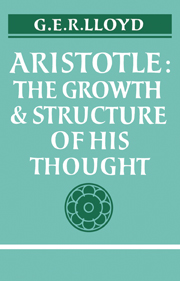Book contents
- Frontmatter
- Contents
- Preface
- Abbreviations
- PART I INTELLECTUAL DEVELOPMENT
- 1 Life and writings
- 2 The pupil of Plato
- 3 The critic of Plato
- 4 The philosopher of nature
- 5 The founder of systematic research
- PART II FUNDAMENTALS OF ARISTOTLE'S THOUGHT
- Suggestions for farther reading
- Glossary of Greek terms
- Index of passages referred to
- General Index
4 - The philosopher of nature
Published online by Cambridge University Press: 06 July 2010
- Frontmatter
- Contents
- Preface
- Abbreviations
- PART I INTELLECTUAL DEVELOPMENT
- 1 Life and writings
- 2 The pupil of Plato
- 3 The critic of Plato
- 4 The philosopher of nature
- 5 The founder of systematic research
- PART II FUNDAMENTALS OF ARISTOTLE'S THOUGHT
- Suggestions for farther reading
- Glossary of Greek terms
- Index of passages referred to
- General Index
Summary
Our analysis of Aristotle's main criticisms of Plato has already suggested thac his reaction against Platonism owes a good deal to his interest in natural science. The realisation of the need to begin the investigation of natural species with the concrete particulars must have deepened, even if it was not the sole cause of, his dissatisfaction with the theory of knowledge advocated by Plato in connection with the Forms. In attempting to document the growth of Aristotle's interests in natural science we have two precious pieces of evidence. First there is the connection which I have already noted between many of the place-names mentioned in the Historia Animalium and the areas of Greece where we know Aristotle lived during the so–called period of the travels from 347 to 335 b.c. The Historia Animalium contains some detailed information about the peculiarities of the animals, especially of the marine animals, found in and around the island of Lesbos, and particularly in the straits and lagoon of Pyrrha on that island, and Pyrrha figures again in the documentation of the two other main biological treatises, the de Partibus Animalium and the de Generatione Animalium. Aristotle's interest in biology no doubt dates from before the time he went to Asia Minor. His father was a medical man, and the problems of classification, particularly of the classification of natural species, were a much discussed topic in the Academy.
- Type
- Chapter
- Information
- AristotleThe Growth and Structure of his Thought, pp. 68 - 93Publisher: Cambridge University PressPrint publication year: 1968



